On Friday April 6th, we hosted our 14th Annual Fundraising Gala — and what a beautiful, love-fuelled night it was! Over 300 guests joined us at the Rocky Mountaineer Station for this year's event, whose hopeful theme was All You Need Is Love. The elegant floral décor, bright Spring colours, and vibrant energy of all in attendance made the evening a wonderful success, and we would be remiss if we did not share our gratitude with the community of donors, volunteers, and supporters who made it all possible!
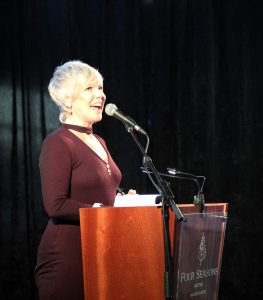
This year's event saw the introduction of a new Looking Glass emcee, celebrated Canadian broadcaster and PEAK radio station founder Tamara Stanners. Returning to the Gala stage was auctioneer Howard Blank, who masterfully kept the Live Auction and Fund-a-Need crowd engaged and entertained as they raised their bid cards in support of our cause. Throughout the evening, guests enjoyed the beautiful décor executed flawlessly by Art of the Party, not the least of which was a stunning handmade flower wall that was bursting with blooms and greenery, and made the perfect backdrop to the BuzzBooth photo booth. The love was popping up in every corner of the room, all night long: from fun and playful photo booth portraits to generous silent auction bids, to volunteers tirelessly keeping the evening flowing smoothly, to the ubiquitous hugs and smiles shared between many attendees. And of course, to cap off an amazing evening, the Moon Coin Show Band gave a highly energetic performance that had guests of all ages on their feet, especially when they drove the Gala theme home with their sunny rendition of the Beatles' hit "All You Need Is Love."
 "Love shows up in a lot of places at the Looking Glass Foundation," Tamara told our guests as she introduced the special video. "It shows up in the passion of the Board and staff, in the self-sacrifice of our many volunteers, and in the amazing generosity of our donors. It also shows up amongst the friends and family of people who suffer; the patience and steadfastness and courage of those who deal with this tragic disease is incredibly profound." As we shared this year's video presentation, which featured the special role of siblings, family friends, and caring supporters in overcoming an eating disorder and embracing self-love, we saw that same steadfast sentiment reflected in the eyes and hearts of everyone in the room. That is the real legacy of the Looking Glass mission: love makes recovery possible.
"Love shows up in a lot of places at the Looking Glass Foundation," Tamara told our guests as she introduced the special video. "It shows up in the passion of the Board and staff, in the self-sacrifice of our many volunteers, and in the amazing generosity of our donors. It also shows up amongst the friends and family of people who suffer; the patience and steadfastness and courage of those who deal with this tragic disease is incredibly profound." As we shared this year's video presentation, which featured the special role of siblings, family friends, and caring supporters in overcoming an eating disorder and embracing self-love, we saw that same steadfast sentiment reflected in the eyes and hearts of everyone in the room. That is the real legacy of the Looking Glass mission: love makes recovery possible.
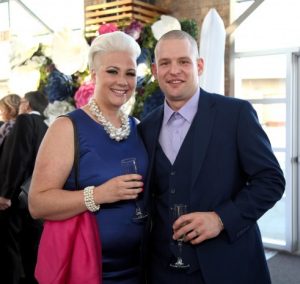
Speaking of steadfast love, we were beyond fortunate this year to welcome to the stage the inspiring husband-and-wife guest speaker duo of Tyson Busby and Jessica Melo. Tyson was one of the first clients who attended the Woodstone Residence on Galiano Island, and our first-ever male client. Tyson and Jessica took the stage to not only share Tyson's remarkable, heart-wrenching story of battling an eating disorder, but also to thank the Looking Glass community of donors and supporters who made his recovery, and ultimately the happy ending they share today with their two beautiful children, possible.
"You could really feel the love in the room," said Executive Director Stacey Huget of the 2018 Gala. "The generosity of our donors always blows us away, but this year’s event was especially moving — I think because we were able to really show them the impact their love makes on those who are struggling to recover."
Together, we raised $380,000 towards our programs, outreach, and community initiatives that support the millions of people affected by eating disorders. We couldn't have done it without our community of compassionate people who care so deeply for those who are suffering from this tragic disease.
Thank you!
— LGF
Photos courtesy of All Things Crystal Photography
By Kaela Scott
Q: I feel really adamant about not letting my family doctor know about my eating disorder but my family has basically given me an ultimatum that either I have to tell him or they will because they feel my health is at risk. I am not sure what to do.
A: First off, I want to validate how hard of a position this must feel like you’re in. Ultimatums, even when done with good intent, usually cause great distress and make decision making even more challenging. It sounds like your family is really concerned about your wellbeing and is hoping that by having your doctor informed it may keep you safe. I also can appreciate the fear of having other people involved in your recovery journey in ways that can sometimes feel triggering or unsafe and make you feel like you don’t have control.
There are, however, some benefits to having your doctor involved in your journey. For starters, they can run the necessary tests to make sure your levels are stable. Making small adjustments can sometimes go a long way in terms of how you feel. For example, if your doctor discovers your iron is low, taking an iron supplement might make you feel more energized and less fatigued. In addition, there is someone there to regularly monitor your physical well-being. Eating disorders can have an impact on your physical health and it is important to have regular check ins to make sure everything is functioning as it should.

So what is the best plan of action when you are stuck in this situation? I think first and foremost it is to think about what type of support and/or relationship you would like to have with your doctor if he or she is going to be involved in your care. Is there a way of involving her that is more on your terms? What are your expectations and boundaries that you need in order to feel safe opening up to your doctor about your eating disorder? I would encourage you to ask your parents to do the same. Once you get clear on these, you can get clear with your parents about what you need in order to move forward in a productive, non-confrontational manner. It would be beneficial for you to have your parents share their expectations so that when you go to your doctor everybody is on the same page and there are no surprises.
If you’re able, I also think it’s important to talk to your parents about how you can all communicate better throughout your journey. The more threats or ultimatums that get delivered, the greater resistance you will have to your own recovery journey. Finding a healthier way to honour your needs and boundaries as well as theirs will leave everyone in a happier place.
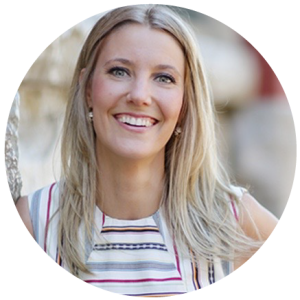 Kaela Scott is a Registered Clinical Counsellor who specializes in Eating Disorders. She runs her own private practice and works with the Looking Glass Foundation in both their summer camp and their Hand In Hand Program. She has been passionate about working with eating disorders since freeing herself from her own struggle and realizing what it is like to be happy and well. When she isn’t working, you can find Kaela either cozying up with a cup of tea and her friends or up in the mountains going for a hike.
Kaela Scott is a Registered Clinical Counsellor who specializes in Eating Disorders. She runs her own private practice and works with the Looking Glass Foundation in both their summer camp and their Hand In Hand Program. She has been passionate about working with eating disorders since freeing herself from her own struggle and realizing what it is like to be happy and well. When she isn’t working, you can find Kaela either cozying up with a cup of tea and her friends or up in the mountains going for a hike.
By Carolyn Digby
It's been nearly ten years since I recovered from my past eating disorder.
This fact hit me the other day and I must admit, it made me very proud of myself. Proud of the work I did in that time of my life to better my future. It's strange; I feel so far removed from that part of my life, and feel like I am a completely different person looking back on that experience. My life is far beyond what I imagined was possible when I was 18, and my past self would be amazed at where I am today; not because of anything specific I've done that has been truly incredible, more so that I'm a functioning, independent adult who enjoys life and has ambitions. Yet that time of my life was a huge part of my developmental years and it would be unreasonable to completely dismiss it, as it is a part of my identity. It has contributed significantly to the career path I'm currently on, and has made me much more empathetic to other people's struggles, as well as forced me to develop strong coping skills.
I believe all of our past experiences contribute to who we are today as individual people; the past is a part of the human experience and it would be irresponsible to completely dismiss it. This got me thinking about all the variations of experience following an eating disorder and during recovery: in the past year I've become very interested in the role social media plays in eating disorders, and through this I found that there are very large communities (predominantly through Instagram) that heavily identify with being recovered from an eating disorder.
There are social media accounts with huge, celebrity-like followin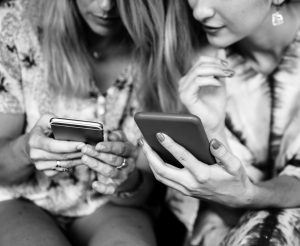 gs, offering a supportive community for those looking to connect with other recovered sufferers. Often, they are individuals who have recovered themselves, posting what they may eat throughout the day, before and after photos of their recovery process, or the various triggers they face on a daily basis and how they deal with them. I've noticed these recovery communities generally cater to a younger population; I can see the appeal in them to the age demographic that has grown up with technology. It is a really good feeling to know that you are not alone, and offers a great opportunity to connect with others who share a similar background and might be going through similar things. As well, these social media communities can serve a purpose encouraging people to hold themselves accountable; to not sink back into disordered behaviours. For the individual who owns the account, the comment sections are littered with notes of positivity and encouragement, as if they have their own cheerleading squad. Generally, it seems pretty positive in nature.
gs, offering a supportive community for those looking to connect with other recovered sufferers. Often, they are individuals who have recovered themselves, posting what they may eat throughout the day, before and after photos of their recovery process, or the various triggers they face on a daily basis and how they deal with them. I've noticed these recovery communities generally cater to a younger population; I can see the appeal in them to the age demographic that has grown up with technology. It is a really good feeling to know that you are not alone, and offers a great opportunity to connect with others who share a similar background and might be going through similar things. As well, these social media communities can serve a purpose encouraging people to hold themselves accountable; to not sink back into disordered behaviours. For the individual who owns the account, the comment sections are littered with notes of positivity and encouragement, as if they have their own cheerleading squad. Generally, it seems pretty positive in nature.
That said, I do have some questions. A huge part of an eating disorder is that it eats up your identity as a person; it takes up all of your time, focus, and energy, leaving little else left for you to identify with. I have to question if these social media recovery communities are simply an identity shift from “eating disorder” to “recovered eating disorder,” and if they may be keeping the person back from truly moving forward with their life and thriving beyond the disorder.
I was curious if any research had been done in this area, and wanted to see how these recovery accounts emotionally affect the individuals operating them and their followers; I wanted to see if they had a positive impact in their lives. Surprise! I couldn't find any academic studies. I suppose this is a relatively new phenomenon. If you can find any, send them my way! However, I did find an interesting BuzzFeed article that outlines Instagram eating disorder recovery accounts:
The article raises some really good points from professionals in the eating disorder field. One doctor is concerned by the lack of professional presence in the communities, which is a valid criticism. If someone posts a picture with a message containing false information, or posts something overly triggering, it may cause damage to someone else. There are no professionally trained counsellors or dieticians monitoring the accounts. Another critic worries that users are replacing real treatment programs with the support of their social media followers, which can be dangerous to their health and cause them to avoid seeking professional help.
Eating disorders thrive in secrecy, and the more we talk about them, the more we take away their power.
However, another professional is very supportive of the communities, saying they offer an opportunity for positive dialogue between those who are seeking recovery, and that the communities offer much-needed support to people who may not have it from other figures in their lives. This makes sense; part of being human is relating to others, and it's so nice to know that we are not in this life alone. Eating disorders thrive in secrecy, and the more we talk about them, the more we take away their power. It's basically saying a big “eff-you” to eating disorders! As well, not everyone has easy access to eating disorder support services, and the communities are a great way to seek support from others.
Upon reflection, I realized that I personally don't identify with “the identity of being recovered” (I suspect I am outside of the age range); I find I am just simply the person I am now. I don't necessarily like the label for myself, as I feel it takes away from my other identities, such as daughter, girlfriend, friend, student, volunteer, and cat mom (I heavily identify with being a crazy cat lady). There is nothing wrong with recovery support communities or the identity they offer, but it is important that each of us chooses to do what is best in order to stay healthy and happy, and that we hold ourselves true and accountable to that practice.
Photo by rawpixel.com on Unsplash

Carolyn is currently completing graduate school, and working towards becoming a certified counsellor specializing in women’s mental health issues. In her spare time, she loves cuddling with her cat, reading, writing, and the outdoors.
By Kirsten Kenward
Self-Love has been a major buzz topic that has come up over the past few years. The fact that there is so much attention being paid to this term signals that people are very interested in, and intrigued by, the idea of loving… ourselves?
Sure, we know how to show love to others. We practice caring for those around us daily, whether through our work, at home, or by giving to charity. However, when it comes to self-love, we aren’t so free to give.
Struggling with an eating disorder adds an entire new layer to this dilemma.
There is a stigma in our society that putting ourselves first is associated with selfishness, greed, and disregard for the betterment of the world and those around us. Sadly, eating disorders are often thought of as narcissistic, selfish mental illnesses that affect only those in more affluent nations. However, this kind of stereotyping does no good. Eating disorders are a symptom of a sick, materialistic society, and so we must dig deeper if we want to begin to heal.
Ultimately, ideas about selfishness stem from a viewpoint of “lack.” A belief that there is not enough to go around, whether it be resources, intelligence, money, or, primarily, L O V E.
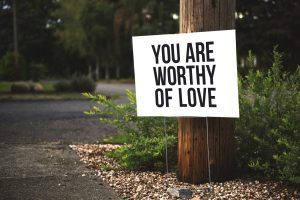
When an eating disorder sufferer uses food to repress or push aside feelings of unworthiness and shame, they are hurting themselves. These behaviours show a lack of self-love, self-regard, and self-compassion. They show a search for recognition of worth from outside of themselves, from a society that will never be able to provide them with what they are searching for: the ability to love themselves for no reason at all.
Because our society largely emphasizes what is wrong with the world (have you ever watched the news?!), we are conditioned to look for the same flaws in our own lives.
How can I lose 10 pounds?
How come that person has a nicer car than me?
When will I get a promotion?
It’s no wonder we can become obsessed with what we think we are missing. And also, no wonder that eating disorders are running rampant as a symptom of this problem.
So, what can we begin to do on an individual scale to incite some change? First, we can learn to give ourselves the benefit of the doubt.
“It’s okay, you are human and you are learning as you go.”
We can begin to show compassion in situations where we would normally beat ourselves to a pulp. We can change our inner dialogue from, “You’re so flawed,” to, “It’s okay, you are human and you are learning as you go.” You’ve probably been in a dark, self-blaming place before and you’ve made it out alive, right? You can do it again, and again, until it doesn’t seem like such a feat.
Second, we can learn to listen to our unique intuitions and connect to our ‘selves’.
Struggling with an eating disorder often means that someone is extremely disconnected to their own body, and soul. We who struggle put the desires of society before our own nourishment and wellbeing and often push our bodies near death while doing so. It is SO important in recovery to learn to connect back with the needs of our bodies and to learn to listen for our internal compass/intuition. Deep inside us, we know that denying our bodies proper nutrition and speaking to ourselves in a derogatory manner are so detrimental to our overall well-being. It takes a great amount of strength and resilience (and time) to begin to want to heal, since there is a ton of shame surrounding the disregard we have shown ourselves during our struggles. However, little by little, it is possible to reconnect. You can take a moment each day to listen in to your thought patterns, you can contact a therapist to work through some of your dysfunctional habits, or you can go for a mindful walk daily to clear your head. However you choose to connect back to learning about yourself will be so beneficial in your healing.
Third, we can talk it out.
Sharing our diverse struggles and experiences often helps not only ourselves, but those around us who may be working through similar things and are not yet ready to speak up.
Be a guiding light in a fearful society. In this way, you are fighting the lack, building a tribe of likeminded friends, and showing others love through respecting yourself.
Photo by Tim Mossholder on Unsplash
 Born and raised in North Vancouver, Kirsten is inspired by nature and the diversity of cultures around her to write about what she sees and experiences. She has a Bachelor's Degree in History and English which she completed at the University of Toronto in 2012, though during this time struggled with anorexia and body dysmorphia. She plans to dedicate her life to awareness of mental and physical health and has been a certified Personal Trainer for over 4 years. She finds freedom and joy through physical endeavours of all kinds, as well as sharing her experiences through writing and dialogue.
Born and raised in North Vancouver, Kirsten is inspired by nature and the diversity of cultures around her to write about what she sees and experiences. She has a Bachelor's Degree in History and English which she completed at the University of Toronto in 2012, though during this time struggled with anorexia and body dysmorphia. She plans to dedicate her life to awareness of mental and physical health and has been a certified Personal Trainer for over 4 years. She finds freedom and joy through physical endeavours of all kinds, as well as sharing her experiences through writing and dialogue.
By Queena Lau
A catalytic moment in my recovery was when I realized that I had been trying too hard to assimilate my present and future with my past. What does this mean?
It means that even while I was actively engaging with my counselors, trying new coping mechanisms, and trying my best to open up about my thoughts and feelings surrounding my mental illnesses, I was always subconsciously framing everything I did as steps that would bring me back to my “normal”—me before my eating disorder, severe depression, and anxiety.
This meant that I was unknowingly refusing to make room for the me that had all these conditions. I was trying to erase her existence to get back on track.
I was always subconsciously framing everything I did as steps that would bring me back to my “normal”—me before my eating disorder, severe depression, and anxiety.
I didn’t realize what I was doing until I had made so many small alterations in my life that my core principles and values had changed, and friends began to notice and comment on them.
Some examples of changes I noticed:
It thus came to a point where I realized that I was never going to be the same person I was years ago, that I wasn’t supposed to, that it was okay, and that I was going to live a life that the me from three years ago would never have expected or seen coming. I learned to acknowledge that I had come into a new identity that I would never have chosen for myself but that I was going to nevertheless adapt to and accept.
point where I realized that I was never going to be the same person I was years ago, that I wasn’t supposed to, that it was okay, and that I was going to live a life that the me from three years ago would never have expected or seen coming. I learned to acknowledge that I had come into a new identity that I would never have chosen for myself but that I was going to nevertheless adapt to and accept.
This makes reconnecting with old friends and acquaintances difficult because I feel and think so differently now. There is, at times, an unspoken pressure to maintain these relationships by re-inhabiting my old self sans eating disorder, depression, and anxiety because that would be easy, but is that beneficial to anyone? I don’t think it is. However, I have at the same time made so many new friends who embody the values and principles that act as the current cornerstones for my character that I don’t feel too saddened by any inevitable distance I experience with others.
How could I expect to be able to live in the present when I kept setting myself up for the past?
I’ve thought long and hard about what it means to be in the present and can finally conclude that it means, in part, choosing to not use your past self as a point of comparison. This is easier than it sounds because it necessitates the awareness of the language you use in your thoughts. The most common refrains I would catch myself using were:
“I should/could have…”
“I’m supposed to…”
“If I were…”
These phrases, in time, became prognostic; I would fall into pensiveness every single time I began a train of thought with such auxiliary words or phrases. They say that insanity is doing the same thing over and over again and expecting different results—so how could I expect to be able to live in the present when I kept setting myself up for the past? I had to eventually acknowledge that these words did not help me. They were anchors that prevented me from thinking as the person I am today, and they stopped me from being able to picture a realistic future.
That is why I have since chosen to readjust my frames of reference by replacing those phrases with:
“I can…”
“I want to…”
“I will…”
and can confirm that it’s been a change for the better. Words are powerful and choosing the right ones can infuse you with a sense of autonomy and self.
Even as I acknowledge all this, I am keenly aware that old habits die hard in the world of eating disorders, depression, and anxiety — and my past was full of them. I find myself at times trying to hold onto who I used to be to justify actions I want to, but should not, take in the present. It’s hard, and sometimes I slip up, but I remind myself that progress is motion forward and that I get to choose who I want to be.
What does the present and future mean for you?
Image: Photo by Megan Savoie on Unsplash
 Queena recently completed her BA double major in political science and English literature at the University of British Columbia, and currently works at a law firm. She advocates open and critical conversations on mental health. Queena hopes to contribute to the dialogue for recovery by sharing her own experiences with an eating disorder, depression, and anxiety.
Queena recently completed her BA double major in political science and English literature at the University of British Columbia, and currently works at a law firm. She advocates open and critical conversations on mental health. Queena hopes to contribute to the dialogue for recovery by sharing her own experiences with an eating disorder, depression, and anxiety.
By Kaela Scott
Q: I keep hearing that recovery is about taking little steps forward but every step feels overwhelming. What should I do?

A: There are so many different messages we hear during recovery about what we have/need/should do to make recovery our reality. While recovery is a subjective experience, one that doesn’t always have a clear road map and that is never the same for two people, one commonality is that it is made up of many little steps. What makes this hard is that each step in recovery, regardless of how small, can feel like a trek up Everest. So what are the best ways to deal with all the overwhelm that comes when we are trying to push against the demands of the disorder and move towards our healthier selves?
Here are 5 tips to try:
I know that recovery can be overwhelming at the best of times. Try giving these things a shot and see if they help you to feel more calm and better able to keep recovery at the front of your mind.
Photo by Chetan Menaria on Unsplash
 Kaela Scott is a Registered Clinical Counsellor who specializes in Eating Disorders. She runs her own private practice and works with the Looking Glass Foundation in both their summer camp and their Hand In Hand Program. She has been passionate about working with eating disorders since freeing herself from her own struggle and realizing what it is like to be happy and well. When she isn’t working, you can find Kaela either cozying up with a cup of tea and her friends or up in the mountains going for a hike.
Kaela Scott is a Registered Clinical Counsellor who specializes in Eating Disorders. She runs her own private practice and works with the Looking Glass Foundation in both their summer camp and their Hand In Hand Program. She has been passionate about working with eating disorders since freeing herself from her own struggle and realizing what it is like to be happy and well. When she isn’t working, you can find Kaela either cozying up with a cup of tea and her friends or up in the mountains going for a hike.
By Kendra Coleman
As I am sitting here on an early Wednesday morning, one hand holding my coffee and the other tapping furiously away on the keyboard, I am reflecting on how my body feels in the current space it occupies. I notice my arms, dangling heavy and loose by my side; my hands are weighted on the keyboard of my computer and my back spreads comfortably across the back of my chair. I notice my tummy and my chest moving in and out. I notice my legs relaxed, one crossed over the other; my right foot heavily anchors my body to the floor. I am grounded by my body that roots me in physical space.
What does it mean, look and feel like to occupy space? In my own experience, learning to occupy space my space has been an integral component in my journey to heal my relationship with my body. Indeed, it has been paramount in learning how to appreciate my body and what it can do for me not just physically, but emotionally, interpersonally, intellectually... and the list goes on!
So, back to the pressing question at hand – what does it mean to occupy space? I feel to occupy space means allowing our bodies to fully inhabit and extend into the space around us. It is to find a place for our bodies in the space that surrounds us. However, even this explanation seems misleading as "to find" implies we need to be actively searching in order to occupy space, and I have learned just the opposite.
For me, occupying space began with learning that my body deserves to extend naturally, comfortably and fully in any setting. Whether it be in a coffee shop, relaxing at home, sitting next to a significant other, moving down the aisles of a grocery store, or walking down the street, our bodies deserve to move and exist free from the psychological and physical constraints that are too often imposed by the thoughts that accompany an eating disorder. With this knowledge, I believe we can start the process of reclaiming space with our bodies.
And from this comes a feeling of empowerment. I can say for certain that it has emboldened me to adhere more firmly to my convictions and my beliefs, to articulate thoughts and engage in meaningful conversation. Why? Because occupying space enables us to more boldly make our voices heard from a secure base, from our bodies grounded in a space we claim.
This feeling of body and space entitlement, of creating a place for ourselves, is a feeling that the eating disorder too often deprives us of. For me, the road to reclaiming place with my body began in the initial stages of recovery. Now, I feel powerful when I allow my body to comfortably and fully spill into the space it occupies. I feel powerful knowing in these moments how far I have come in my own recovery. To sit, and be, and allow my body to flow freely without restrictions once seemed like an impossible endeavour. Yet, here I am, sitting, being, typing! I believe we can all get to a place where we put our bodies first.
Of course this may sound a bit daunting, especially in the grips of an eating disorder. So, as is the case with most recovery steps, we can start small. For me, I was tasked with sitting at a coffeeshop for just 5 minutes, owning my space, and making eye contact with other customers. It sounds silly to say now that this was a tremendously anxiety provoking experience at first, as I imagine it may be for many of us when we tackle our eating disorders head on. The little ED voice in my head told me that, by meeting the gaze of others, I would be showcasing my body and the amount of space it occupied. And that was frightening. However, with practice and support, that voice and the fear that accompanied it began to dissipate. I sat 5 minutes, then 10, then 30. And it all started with a little feeling of entitlement: My body has a right to be here! Our bodies deserve to exist naturally and comfortably in every space we occupy. Because the ED can deceive us into believing otherwise, it is so important to continue reminding ourselves of this as often as we can.
Which brings me back to where we began: Noticing and acknowledging the feeling of our bodies in space. Noticing the weight of our feet, legs, and arms grounding us in the space we occupy. Carving out a place for ourselves. A place that our bodies deserve to occupy. A place of knowing, feeling, and appreciating our bodies and, in doing so, feeling empowered in moving either toward or through recovery. What small steps can we take today, together?
Photo by Alexa Mazzarello on Unsplash

Kendra is currently completing her BA in psychology at the University of British Columbia, and is a research assistant with the UBC Sexual Health Laboratory. She is a past resident of the Looking Glass Residence and is passionate about sharing her insight and experience with others. Now in recovery, Kendra is open about her struggle battling anorexia and bulimia. She hopes to be a support and ally to those who are suffering while also working to reduce the stigma around mental illness. Her passions include violin, spin class, academics, beach walks with her dog, and chatting over coffee with close friends.
By Colleen Addison
I don’t have Netflix, so I haven’t seen “To the Bone,” the latest “anorexic drama” starring Lily Collins. I don’t think I want to; it looks stupid and stereotypical. But the pictures of Collins, pretty and pale-cheeked in her oversized hospital gown, her face perfectly made up …these are causing me to consider the depictions of eating disorders with which I grew up. I had anorexia in 1992, when I was 16, so in the years before that, I was paying perhaps a bit too much attention to media portrayals of the disease. But really, in 1992, anorexia was everywhere.
Illnesses are cultural phenomena. Doctors and health researchers have long asserted the difficulties of diagnosing people in the past, as patients and physicians describe symptoms in terms understandable to a particular time and place. In this way, England’s Queen Mary I, who in her childhood suffered from “pangs,” has been labelled in modern times as suffering from a varied selection of diseases such as anxiety and endometriosis, through to anorexia. Links between culture and eating disorders, though, are often seen as closer, what with cultural perceptions of beauty and femininity. Could we, asks Joan Jacobs Brumberg in her award-winning Fasting Girls: The History of Anorexia Nervosa, conceive of anorexia before Twiggy?
Eating disorders did of course exist before 60s fashion gurus started making shift dresses to highlight a new, young, and thus thin, body ideal. But it’s hard to know when eating disorders began, when medical practitioners first talked about patients whose relationships with food were recognizably screwed up. Still, few are in doubt that the first eating disorder identified was anorexia nervosa. First mentioned in the 1870s by numerous practitioners, the fame of anorexia was ensured by the fact that one leading consulting physician was William Withey Gull, renowned for his later association with Queen Victoria. (She wasn’t anorexic. He helped cure her son of typhoid.)
Fast forward to the new century, and eating disorders still weren’t really visible. But in the 1960s, cases of hospitalization spiked, and doctors began to specialize in eating disorders, including Maria Selvini-Palazolli, the physician who blamed anorexia on the new, post WWII Italian affluence. In 1974, eating disorders became part of the popular lexicon, primarily anorexia, of course, which earned its own subheading in the Reader’s Guide to Periodical Literature, a library reference tool that lists popular articles for specific topics in a given year. By 1983, eating disorders had claimed their “first” celebrity, singer Karen Carpenter, dead of heart failure and hypokalemia (low potassium), symptoms of self-starvation, or anorexia. By 1984, anorexia was familiar enough to be used as a joke. In “Splash,” a store clerk comments on Daryl Hannah’s beauty and thinness. “My daughter’s lucky,” says the clerk, in a line now often cut out of showings. “She’s anorexic.”
Anorexia was not the only eating disorder known in the 1980s. In 1979, physician Gerald Russell identified bulimia, which he called it an “ominous variant” of anorexia. Later it was suggested that Karen Carpenter, holder of several prescriptions for vomit-inducing medication, was really a victim of this second disease. Still, it was anorexia and its accompanying glamourized images of elegantly slender pretty young women, that had caught the public’s attention.
 In the late 1970s and early 1980s, there were “dramas,” stories where a descent into, and sometimes a recovery from, eating disorders featured as the primary plot. Often these were books, set in the new and growing genre of “young adult.” And mainly these were about anorexia. Arguably the first and almost certain the best known of these was Steven Levenkron’s 1978 novel, The Best Little Girl in the World, the sales of which were later boosted by news that psychotherapist Levenkron had treated, or tried to treat, Karen Carpenter. It centred on a young girl, Francesca, who suffered from, of course, the newly topical disease of anorexia. In 1981, the book became a film, starring Jennifer Jason Leigh, whose admission that she had dieted herself into the role led to rumours that she, too, was anorexic.
In the late 1970s and early 1980s, there were “dramas,” stories where a descent into, and sometimes a recovery from, eating disorders featured as the primary plot. Often these were books, set in the new and growing genre of “young adult.” And mainly these were about anorexia. Arguably the first and almost certain the best known of these was Steven Levenkron’s 1978 novel, The Best Little Girl in the World, the sales of which were later boosted by news that psychotherapist Levenkron had treated, or tried to treat, Karen Carpenter. It centred on a young girl, Francesca, who suffered from, of course, the newly topical disease of anorexia. In 1981, the book became a film, starring Jennifer Jason Leigh, whose admission that she had dieted herself into the role led to rumours that she, too, was anorexic.
By the late 1980s and early 90s, anorexia, familiar enough to be recognizable by shorthand, was present in a good many popular tv shows and books. In a series of teen books (Maggie Adams, Dancer; Maggie Adams: 18th Summer; Stay on Your Toes, Maggie Adams!) by Karen Strickler Dean, Maggie’s friend Lupe is terrified of getting fat. She skips meals…problem! In Beverly Hills 90210, blonde and beautiful Kelly has only to pinch her waist and look pensive, and we know there’s trouble. Sweet Valley High, the popular book series that later became a (short-lived) tv show, performed a cheat. Tricia is pale and picks at her food; anorexia is suspected, but then we learn that she has that other 1980s disease, leukemia.
In all these depictions, stereotypes rule. All are of girls. Ballet, an environment associated with femininity, features prominently. Dean’s Lupe is a dancer. In The Best Little Girl in the World, Francesca, too, takes lessons, and it’s a comment by her dance teacher, that first starts her on the path to her eating disorder. All are white, Western, well-off. Kelly lives in Beverly Hills, not exactly the world’s poorest, most diverse neighbourhood. In The Best Little Girl, Francesca is hospitalized and given a black and presumably lower-class roommate. Francesca’s behaviour, says the roommate dismissively, is found only in silly “white girls” who can afford it.
I look at the world today, and I do see some changes. Sure, Collins is white, and so, it looks like, is everyone else in the production. To her credit, Collins has been open about her own struggles, but, as the daughter of Phil, she’s Hollywood royalty, so no rich girl stereotypes smashed there. But changes are still present in other media. In Not Otherwise Specified by Hannah Moskowitz, yet another young adult book featuring eating disorders and ballet dancing, Etta Sinclair is bisexual…and black. This is important; in 1992, indoctrinated by the media, I thought you couldn’t get anorexia if you were black. To be fair, I didn’t know anyone who was black either, but researcher Joan Jacobs Brumberg, author of Fasting Girls: The History of Anorexia Nervosa, calls anorexia a white disease.
And perhaps even more important, other eating disorders are adding to depictions of anorexia. In “Gossip Girl,” the bottoms of Blair’s high heels, seen under the half-door of the bathroom stall, signify that she is kneeling before the toilet; she has bulimia, not anorexia. Glee’s Marley, too, has bulimia. This matters. Yes, you could argue that these depictions are still of the same old stereotypes, a glamorization of yet another eating disorder, and an ignoring of others. That’s problematic. Blair and Marley are white, and reasonably well-off. (I know Marley says she’s poor. That’s some nice fashion for a poor girl, and she doesn’t have to work.) They dress well and look pretty. But 140 years after the identification of eating disorders, over 40 years since eating disorders made it into the public eye, maybe it’s time we saw them at least a little bit more in their entirety.
Sources: Russell, G. F. M. (1979) Bulimia nervosa: an ominous variant of anorexia nervosa. Psychological Medicine, 9, 429 -448.PubMed
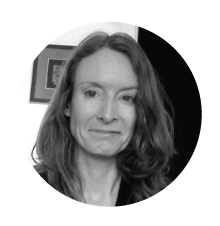
Colleen recently completed a PhD in information science, looking at the ways in which people perceive and respond to health information. She loves yoga, Pilates, jasmine tea, and her little cat Summer.
By Alessia Turco
I recall being in the fifth grade and wondering why I didn’t resemble the other girls in my class. I did, I was just under the impression that I didn’t. Who I was in my mirror and who I was in photos was not the same entity. It was draining to be ten years old and worrying about problems bigger than my adolescent mind could even fathom, but I believed it was something that passed through everyone’s minds. We talked about mental health in school, but it never really deviated from the typical depression and anxiety discussion. I was young, of course, but I really had no idea what was going on in the corners of my mind. I was just discovering myself, my place in this world, and my body. I was introducing myself to this whole new life of lust and romance, a life in which I didn’t think I made the cut. I felt undesirable to the point where I would fake ill just to be sent home because I couldn’t bear to be seen in public. This was at the age of 10, where my only problems should be cleaning my room and finishing the fifth grade.
Ninth grade was much more difficult than I had anticipated it to be. I had just established a group of friends in which each and every girl was intoxicatingly beautiful, and I was in constant concern of whether or not I fit into that brand— but I assumed that was something that nearly every teenage girl went through (as if it was a right of passage). It wasn’t until webegan a project in class, in which we were to use a popular calorie counting app to record our intake for two weeks and finish off with an introspective essay on our individual health. The difference between me and the other students is that, after the two weeks, I didn’t stop. I kept tracking my eating for months, sticking to the automatic caloric intake goal, which was already extremely low compared to a proper healthy diet, until even that became too much for me. I guess you could say it gave me a rush, emotionally and physically, something I assumed my classmates felt as well.

When it comes down to it, no— not everyone has an eating disorder. Not everyone spends their days trying to find ways to be in control of their diet and their life. Not everyone has the perpetual anxiety of how they will get out of the next meal. Not everyone has the extreme guilt, yet extreme contentment, after a binge and purge. Not everyone’s emotions have taken such a toll and it is not normal to be so mentally exhausted. This distortion was so ingrained within my developmental process that it was a complete shock once I was taught that what I was feeling and what I was doing was not normal.
This didn’t stop me, though, it just brought on shame. This shame caused me to hide it in any way I could, regardless of the repercussions. Eventually, it became a sort of game to me, like I had this secret that no one else knew about and it made me feel powerful. I never felt powerful before. This nature of the disorder went on for years until my health caused it to be brought to the attention of those close to me.
There's a lot of misconceptions about how eating disorders develop. It’s not about the food— it’s about punishing yourself. It’s a coping mechanism in which you desperately need dominance over your life and decisions because your surroundings and/or mind is out of control.
I guess that’s when I understood that not everyone is depressed. Not everyone has mental illnesses. I grew up in the mindset that my mental illness induced thoughts were normal, that my maladaptive coping mechanisms were just a part of growing up, but they're not. What I went through and what so many other people go through is not normal, so it’s fair to be consumed. It is fair to second guess every thought you have because you can never know if your disorder is clouding your rational judgment, and it is fair to feel weak. That does not mean you are weak, though. Getting treatment and reaching out for help was the strongest thing I have ever done.
 Alessia is a psychology major at Simon Fraser University and hopes to specialize in clinical counselling. Her interests lie in fine arts, poetry, and spending time with her loved ones. She openly speaks about her recovery and is always willing to lend a helping hand to those struggling with their mental health.
Alessia is a psychology major at Simon Fraser University and hopes to specialize in clinical counselling. Her interests lie in fine arts, poetry, and spending time with her loved ones. She openly speaks about her recovery and is always willing to lend a helping hand to those struggling with their mental health.
By Sara Cohen
For as long as I can remember, I’ve struggled with my relationship with my body. For the past 23 years, I’ve been actively recovering from an eating disorder. In the past 5 years, I’ve finally felt like I was in a place where recovery wasn’t an active struggle. It isn’t that time finally caught up and I stopped caring about food or my body, or that the eating disorder magically disappeared. What happened is that I started running.
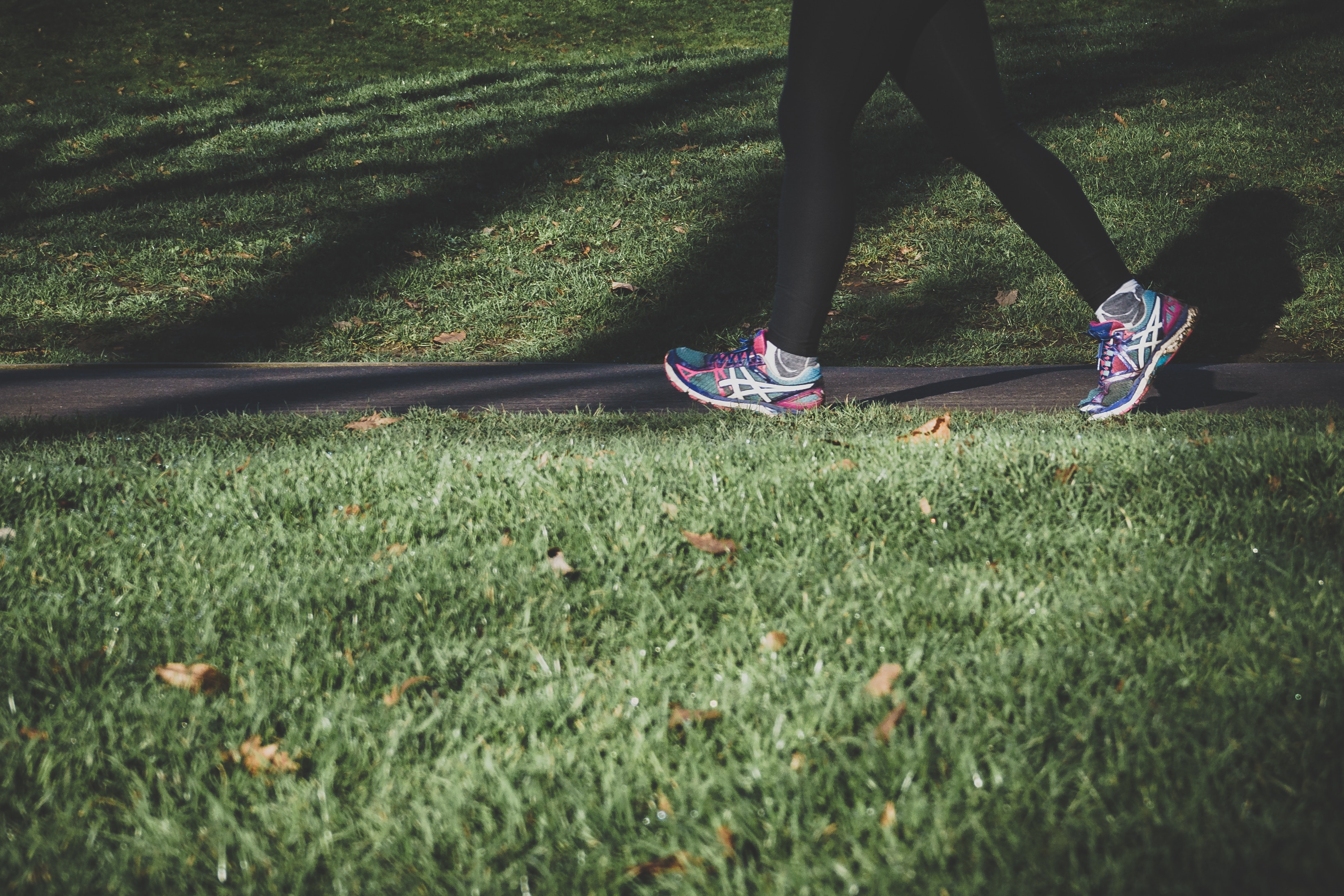 Running is something I once used to fuel the destructive nature of my eating disorder, something I once did for the calorie burning affects, something I once hated. Five years ago, I really “found” running again, but this time as a source of mental release. Over time, I found that aside from the mental benefits, I learned to appreciate the strength and endurance of my body. I set distance and speed goals for myself and found that attaining those goals was as much mental as it was physical. With that, I found the power of linking my emotions directly to my physical body, something I completely avoided during my recovery. Running now propelled me to a place where I sought to pay attention to my body, nourish it well, and take pride in everything my body could do. Food was no longer about calories and fat content but about being fuel for my body. I was in a great place, and appreciated how normal I felt after spending so many years quieting the part of me that disapproved of everything about my body.
Running is something I once used to fuel the destructive nature of my eating disorder, something I once did for the calorie burning affects, something I once hated. Five years ago, I really “found” running again, but this time as a source of mental release. Over time, I found that aside from the mental benefits, I learned to appreciate the strength and endurance of my body. I set distance and speed goals for myself and found that attaining those goals was as much mental as it was physical. With that, I found the power of linking my emotions directly to my physical body, something I completely avoided during my recovery. Running now propelled me to a place where I sought to pay attention to my body, nourish it well, and take pride in everything my body could do. Food was no longer about calories and fat content but about being fuel for my body. I was in a great place, and appreciated how normal I felt after spending so many years quieting the part of me that disapproved of everything about my body.
I wondered at times, “what will I do if I can’t run anymore?”
Last summer, I was diagnosed with a knee condition that slapped me in the face with that very question. The reality was that I needed extensive preservative work done on my knee, due to damage from past surgeries on the same knee. The preservative work would be a temporary fix until I am more age appropriate for a knee replacement. When I asked about running, the doctor left it for me to decide, but made it abundantly clear that running would wear through the preservative work more quickly and would be a terrible idea. Without the surgery, I was at the point that I couldn’t walk or sit without pain that was worsening by the day. With the surgery, the smartest decision would be to give up running with the hope that some other passion could replace it.
Aside from knowing about how difficult the physical recovery would be, I was very worried about losing ground on the progress I’ve made over the past 5 years. Would I fall back into eating disorder mode, or recovering-but-struggling mode? Would I again find fault in everything about my body? Much like I didn’t know who I was without my eating disorder at one time, I now didn’t know who I was without running.
So here I am: 5 months past a smaller first surgery, and 10 weeks past the very big surgery. July 31 was the last time I ran and while I have big hopeful plans for biking and swimming in my future, there are no running plans ever again. And I am ok. Far better than I thought I would be. But it has not been easy, nor will it be anytime soon. I have not regressed back to old habits, if anything this experience has shown how strong I am in my recovery. I have had to do a lot of intentional thinking and planning to keep myself in a place that I feel good about. It was exhausting for a while, and I worried that I would tire of being diligent and lose ground little by little. But as with many things in life, practice makes perfect.
This story isn’t without struggle. Immediately after I stopped running, a struggle with body dysmorphia began. I was expecting it, but was not prepared for the intensity or for it to last a solid month. There were a few key things I did to move past it:
Once I decided that I would stop running, I worried that I wouldn’t know what or how much to eat. As a runner I really ate whatever, whenever, and did not gain or lose weight. I ate appropriately to fuel my longer runs, but otherwise ate because I wanted to. I did not want to start tracking calories or limit food groups for fear of slipping back into a disordered way of thinking. I wondered if my brain and body together could be trusted to regulate my eating. In the early stages of this process, I stressed about everything I ate, and stressed about the fact that I was stressing about food for the first time in many years. It felt like forever, but was really only 6 weeks or so before I realized that I felt hungry at appropriate times, and felt satisfied after I ate. I am pleased that my body knows what to do. I have not cut any food groups out, nor is anything “off limits” but some days more than others, I would be lying if I said I don’t think about the type of food I eat.
This has not been easy. I know that the potential for struggle with my body and food will always be there, but I am really proud of how well I have done so far. Once my knee is healed I will be able to do more with my body, and maybe find something to replace what running was for me. Hopefully, the worst of this is over. Although I never wanted to write a post about not running again, I have found silver linings in trying to process all of this. I feel even more confident in my recovery from anorexia and bulimia, and am far more aware of triggers and feelings related to my eating disorder history. I have become far more understanding and protective of my body. I have voiced my feelings, ones that would normally stay in my head, to my closest people so that they can help me. I check in with myself and take care of myself, some days before I do so for my husband and kids. And finally, I am looking forward to setting new goals for myself, first around healing and strengthening my knee, and later around new physical adventures.
Photo by Arek Adeoye on Unsplash
Sara is a neonatal nurse, with a master's de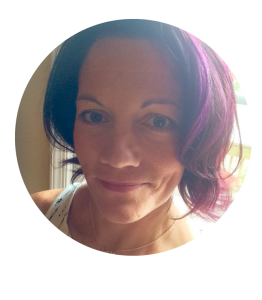 gree in nursing education. She lives in Philadelphia, Pennsylvania (US) with her husband, 2 young boys, and 2 dogs. She openly speaks about her recovery from anorexia and bulimia with the hope that she can be a positive influence to anyone who needs it. She is a former distance runner who is eager to start biking and swimming. Her passions include her kids, staying active, reading, turtles, and all things purple.
gree in nursing education. She lives in Philadelphia, Pennsylvania (US) with her husband, 2 young boys, and 2 dogs. She openly speaks about her recovery from anorexia and bulimia with the hope that she can be a positive influence to anyone who needs it. She is a former distance runner who is eager to start biking and swimming. Her passions include her kids, staying active, reading, turtles, and all things purple.